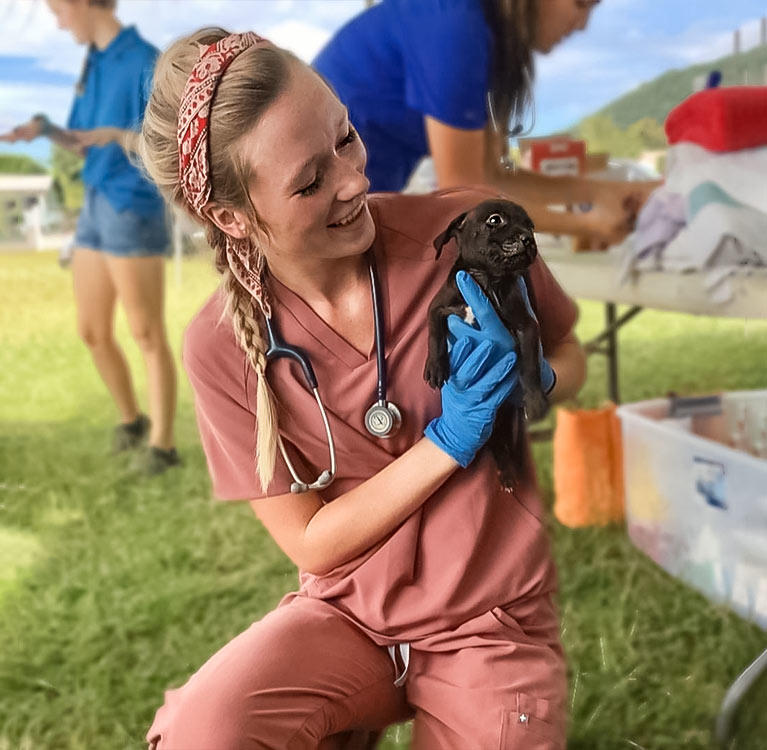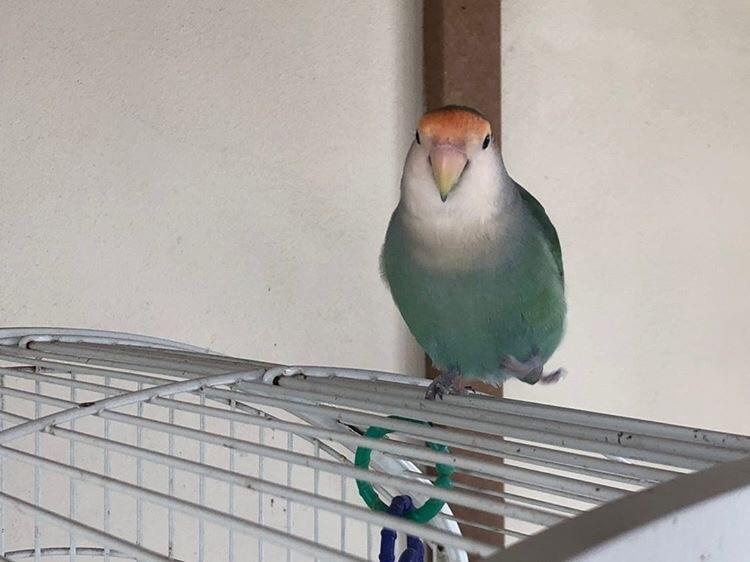The vast majority of veterinarians opt to work with pets and other small animals, but some animal doctors prefer to go a bit bigger and specialize in large animal medicine—the veterinary specialty dealing with the health and well-being of cows, horses, and other animals too big to be offered a bed inside the house. Specialists in large animal medicine provide complete health care for livestock and other big animals, but they are also key to human health. Because many large animals are also food animals—meaning they are raised and used for food production or consumption by humans—their health can have a direct impact on human health.
Large animal specialists often work where the animals are—mainly on farms and ranches—so the work includes many miles of rural driving and getting dirty with the animal patients. Large animal veterinarians may deliver a calf, administer a vaccine, or perform a surgery—all on one visit! If you are interested in becoming a specialist in large animal medicine you should be aware that it is a long and intense—but rewarding—path. The long path can include eight years of undergraduate study and veterinary school, and some large animal doctors further their studies with internships or specialist residencies.
The schooling requires dedication and patience, as well as excellent grades and test scores. It also requires a desire to learn and the compassion to help big animals live better and healthier lives. Aside from their academic talents, large animal veterinarians often have a farming background or a special affinity for the bigger farm animals. The steps to becoming a large animal medicine veterinarian are detailed below. Consider everything well—it is a big decision to start down the path. If you think you want to be a large animal specialist, ask yourself some questions:
- Do you enjoy being on farms? And do you like being around farm animals?
- Are you interested in cows, pigs, and sheep?
- Do you enjoy the biological sciences?
- Are you fascinated by—and ready to handle—large animal anatomy?
- Do you want a challenging and rewarding career?
- Do you want to combine preventive medicine with curative medicine and surgery?
- Are you dedicated to improving the lives of animals?
- Are you an excellent student who wants to continue learning?
If you answered “yes” to one or more of these questions, then a career as a large animal medicine veterinarian may be for you.
WHAT DO LARGE ANIMAL VETS DO?
Many large animal vets end up as bovine specialists who work with beef and dairy cattle, which are found by the tens of millions in rural regions across the United States and Canada. Large animal specialists, also known as livestock veterinarians, may also care for such farm animals as bulls, donkeys, goats, hogs, horses, and sheep, as well as more exotic livestock such as alpacas, bison, llamas, and reindeer—even the occasional water buffalo or yak. Large animal veterinarians vaccinate animals against disease, treat them when they are sick, and consult with farmers and ranchers on nutrition as well as housing and production practices. Large animal doctors may treat broken bones, colic, and injuries and lacerations, and they often aid in fertility, pregnancy, and birth. In cattle, large animal veterinarians treat such diseases as:
- Bovine respiratory syncytial virus (BRSV)
- Bovine spongiform encephalopathy (BSE)—the so-called “mad cow disease”
- Bovine viral diarrhea (BVD)
- Haemophilus somnus
- Parainfluenza type 3 (PI3)
- Pasteurella Haemolytica / Multocida
- Rabies
Similar diseases are diagnosed and treated in other large farm animals. Veterinarians may make weekly health checks on herds of cattle—as well as on droves of hogs and herds of goats and sheep—checking for any signs of illness or pregnancy—or problems during pregnancy. The birth of calves, foals, kids, lambs, and piglets are crucial to the economic survival of a farm, and extra care is given to ensure the safety of both mother and offspring. Delivering young animals at birth—called calving in cows—can sometimes be difficult, but it is one of the more important chores of a large animal vet. Other tasks and procedures include:
- Castration
- Dehorning
- Disease prevention, identification, and treatment
- Health inspection and approval
- Record keeping
- Rectal palpation (to determine pregnancy)
- Researching and reviewing new drugs
- Ultrasounds and X-rays
- Vaccinations
By caring for food animals, large animal specialists help protect human health by safeguarding the food supply and preventing animal illnesses from passing to humans through meat, milk, or other food products.
Some large animal specialists care for more exotic animals by working in zoos, while others rarely spend time with animals at all. The latter specialists may perform research, help maintain safety regulations, teach, or do other tasks linked to the health of large farm—and particularly food—animals.
HOW DO YOU TRAIN FOR LARGE ANIMAL MEDICINE?
You may be curious to know how to become a big animal vet, and what large animal veterinarian education requirements are. A large animal medicine specialist studies to become a Doctor of Veterinary Medicine (DVM) by attending a veterinary program accredited by the American Veterinary Medical Association (AVMA)—such as Ross University School of Veterinary Medicine’s (RUSVM) DVM Degree program*.
RUSVM runs an accelerated DVM program of 3.25 years, but most veterinary schools are four years. Some veterinary schools offer special large animal paths of study, during which you learn core competencies and prepare for bovine or other large animal practices. After graduation, most large animal DVM’s enter general practice, but some advance to one-year veterinary internships ahead of applying to three- or four-year large animal residencies in such subspecialties as:
- Dentistry
- Food Animal Medicine and Supply
- Internal Medicine
- Neurology
- Preventive Medicine
- Production Management
- Radiology
- Surgery
- Theriogenology
- Zoological Medicine
DVM's are certified in large animal practice by the American Board of Veterinary Practitioners, the American College of Veterinary Internal Medicine (ACVIM), the American College of Veterinary Nutrition (ACVN), or by the board of their eventual specialty. You may then apply for membership in the American Association of Bovine Practitioners (AABP), the AVMA, the National Association of Federal Veterinarians (NAFV), the U.S. Animal Health Association (USAHA), and other professional societies.
A CAREER IN LARGE ANIMAL MEDICINE
As a large animal medicine specialist, you have the opportunity to work in a private practice, but many others work in government agencies, research facilities, specialized animal clinics, universities, or zoos. Regardless of where you call home, nearly all large animal doctors provide ambulatory service—meaning you’ll go to the animals rather than the animals coming to them. This provides a good degree of independence, but also many hours of travelling to and from farms, ranches, and other facilities.
Large animal vets may work long hours, including weekends, and are often on-call for emergencies. Aside from examining, diagnosing, and treating patients, you’ll consult with animal owners and organizations, large animal care team members, and other veterinary specialists. You’ll also dedicate time to research, studying, and teaching—some board-certified large animal medicine specialists opt for academic positions instead of going into practice.
Because of the food supply aspects of large animal medicine, many such specialists work in the federal government for the Food and Drug Administration (FDA), the United States Department of Agriculture (USDA), and other agencies. Government-employed veterinarians opt for “public practice” over private, and may serve as Veterinary Medical Officers or Public Health Veterinarians at the state or federal level. Large animal vets work in such FDA programs as the Animal and Plant Health Inspection Service (APHIS), the Center for Veterinary Medicine (CVM), the Food Safety and Inspection Service (FSIS), the Office of Minor Use and Minor Species Animal Drug Development (OMUMS), the Office of New Animal Drug Evaluation (ONADE), the Office of Research (OR), and the Office of Surveillance and Compliance (OS&C).
DEMAND FOR LARGE ANIMAL MEDICINE SPECIALISTS
Demand for all veterinary specialists is high. According to a United States Department of Agriculture (USDA) report in 2020, there are over 94 million cattle in the United States alone, the shortage of bovine and other large animal veterinarians is felt throughout the country, particularly in rural areas.
A recent United States Department of Agriculture (USDA) report identified a shortage of food animal medicine practitioners in rural parts of nearly every U.S. state. The need is especially great in central states from Minnesota to Texas. Also, consultations with large animal medicine specialists have increased in recent years as farmers work ever harder and smarter—sharing technology with veterinarians to track pregnancies and other conditions—to maximize the health of their herds.
Ross University School of Veterinary Medicine provides an accelerated, broad-based curriculum that integrates unique research opportunities, classroom study, and hands-on clinical training. Take the next step on your path to becoming a large animal veterinarian: apply for admission to RUSVM.
Related resources:
- Inside Look: Ross Vet’s Large Animal Teaching Facility
- What Does a Large Animal Vet Do?
- DVM Program
- DVM Curriculum
*Ross University School of Veterinary Medicine confers a Doctor of Veterinary Medicine (DVM) degree, which is accredited by the American Veterinary Medical Association Council on Education (AVMA COE), 1931 N. Meacham Road, Suite 100, Schaumburg, IL 60173, Tel: 800.248.2862. For more information please visit: https://www.avma.org/education/accreditation-veterinary-colleges.
The AVMA COE uses defined standards to evaluate veterinary medical education programs, including facilities, clinical resources, curriculum, faculty, student outcomes and research programs. The standards are interpreted and applied by the AVMA COE-accredited veterinary medical education programs in relation to its mission.






